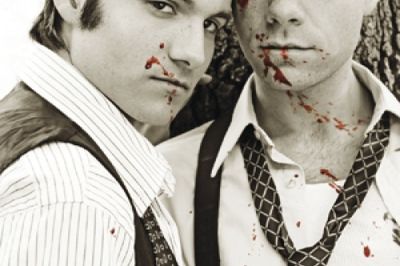Among the many offerings of this year’s Fringe Festival — from July 23 to Aug. 1 — will be the Fishtank Performance Studio’s premiere of Stephen Dolginoff’s Thrill Me. Directed by Jeff Church and featuring musical director Daniel Doss, the musical stars Shea Coffman and Bryan LaFave as the two cold-blooded killers Leopold and Loeb, reportedly a couple, and their 1924 murder of 14-year-old Bobby Franks.
Leopold and Loeb were two young and wealthy Ivy League college students planning to get law degrees from the University of Chicago. They allegedly kidnapped and murdered Franks for ransom money. But the money may not have been the primary motive. It was reported that they murdered for the thrill of the kill or to try to get away with the perfect crime.
“In our production, the murder is not the climax of the play,” Church said. “I mean, the murder is done by Scene 3 or 4. It’s the relationship and the mistake they make at the crime scene and as the noose closes in on them, the police close in on them, their relationship and what happens to them is really the interesting part.”
The two were represented in court by the famous attorney Clarence Darrow, and the trial was a media sensation in the 1920s. It was referred to as the “Trial of the Century.” Darrow succeeded in avoiding the death penalty for his clients, and they were sentenced to life in prison.
“Leopold and Loeb’s story has appeared in films and in plays over this past century in various ways, the most famous probably being that they were the inspiration for Alfred Hitchcock’s film Rope,” Church said. “There was also a movie and a play called Compulsion and then there was an off-Broadway non-musical called Never the Sinner. But that’s only a few of the many.”
Although it was assumed that the couple was romantically involved, Church said, the subject of homosexuality was not easily discussed in the ’20s.
“They wouldn’t have used the word gay but clearly they strike a pact together that is clearly a gay relationship that kind of has S&M overtones. By that I mean there is definitely a dominant and a subordinate character, and the pact they strike is the one says ‘If you do this for me [crime spree> then the other person will get the sexual gratification that the character wants.’ So that’s right up front. It’s like in Scene 2. That tortuous relationship between these two men is sort of the character foundation of the whole piece.”
“This play imagines conversation between these two, because no one was really privy to what they truly said to each other back then. … These were Phi Beta Kappa boys from a privileged Chicago background. They had been reading Nietzsche, and the one got it into his head that Nietzsche’s definition of Superman applied to them and parts of their behavior could be above the law.”
“It’s just a two-character play, which is an ideal fit for this little theater space we’re performing it in,” said Church.
“What a privilege,” he said, “to get to be in a small room hearing those voices with that great musical accompaniment by Daniel, who’s one of our city’s best.”
In the actors, Church said, “We have some great, amazing singers. Not only do I think the audiences will follow our two actors, Leopold and Loeb, in their kind of psychosexual relationship, but they are also going to have a feast for the ears, because it’s a very lush score, a really dense piano score backing these two kind of soaring vocals.”
Church, the Coterie’s producing artistic director, recently directed Pride &
